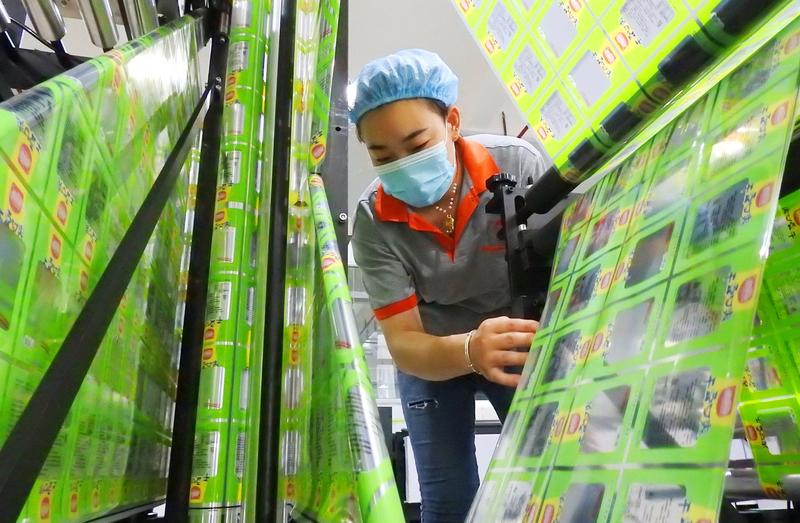 An employee checks equipment at a plastic package production facility in Lianyungang, Jiangsu province, in August. (GENG YUHE / FOR CHINA DAILY)
An employee checks equipment at a plastic package production facility in Lianyungang, Jiangsu province, in August. (GENG YUHE / FOR CHINA DAILY)
The State Council executive meeting on March 24 announced that the previously introduced inclusive loan repayment extension and the credit loan support program for smaller businesses will be extended till the end of this year.
It's a step that will help further ease liquidity burdens faced by small businesses.
The two tools, more commonly known as the direct-benefit monetary policy tools, were first introduced last June, when the COVID-19-induced impact on the country's economy was severe and unprecedented.
Smaller and micro businesses, mostly clusters in manufacturing, innovative technology and services, are those with the most at stake. Since June, the two tools were expected to help spur new bank loans worth about 1 trillion yuan (US$152.2 billion) to small businesses.
It's the second time that the State Council's executive meeting decided to extend application of these tools.
Over the week, the announcement has drawn the attention of policy analysts, researchers and banking industry insiders.
Most see the deadline extension as a "much-needed" move for small businesses, which are "still making arduous efforts on the road to a comparatively slower recovery".This is particularly true of those in the services sector.
Economic data since January showed that the country's economy is well on track for a robust recovery.
Yet, some said smaller and micro businesses, particularly those in manufacturing and services, may need more time to get on the same page.
While the economy is steadily returning to normal, continued efforts are required to help address the difficulties that bedevil smaller enterprises. This is why the loan repayment deadline extension move of March 24 is crucial.
"Small and micro businesses are leading job providers, and many of them have strong potential for growth, said Xiao Lisheng, senior international finance researcher at the Chinese Academy of Social Sciences, who closely follows the recovery of micro businesses and the policy support they are receiving.
Small and micro businesses are leading job providers, and many of them have strong potential for growth.
Xiao Lisheng, Senior international finance researcher at the Chinese Academy of Social Sciences
ALSO READ: New system to improve SME lending
He stressed that securing stable employment this year will mostly hinge on a vibrant community of smaller businesses that keep the economy up and running.
"As for the economic impact of the pandemic, it was those low-incomers that were deeply affected as they mostly rely on small businesses for employment," Xiao said.
For example, the income level of migrant workers has not returned to pre-COVID-19 levels so far, he said.
The country now has 90 million registered household businesses. They have helped create employment for more than 200 million.
So, increasing credit support for micro businesses and curbing financial risk has always been a tough balancing act.
There are other voices that commercial banks may not have a strong incentive to implement such loan repayment deadline extensions as smaller businesses usually bear comparatively higher risks.
Even if fully implemented, the extension move may lead to an increase in banks' non-performing loans, as the loan principal amounts and the interest thereof will "need to be paid back eventually some time in the future" and some small companies may fail in spite of the liquidity infusion.
Wen Bin, chief analyst at China Minsheng Bank, said the March 24 move could prove to be a test for both banks and smaller businesses amid this unusual time.
READ MORE: China's local govts use policy tools to boost SME lending
"Based on market principles, the loan extension program needs to be agreed upon after negotiations and an agreement between the bank (s) and the firm concerned," Wen said.
"Smaller businesses facing difficulties may be in a phase that's temporary. And if such businesses receive the financial support they need, they will likely survive and become profitable enterprises over the long term, thus providing sustenance to the banking industry."
The repayment extension is conducive to small businesses because it means their credit will not be affected. After all, credit is their "lifeline", which is why they turn to banks for loans in the first place.
In a larger context, Xiao said he believes extending these policy tools is a strong signal to the market that the country's support for smaller businesses will be steady, consistent and intense.
Since last year, China has put in place a raft of fiscal and monetary policy support to bolster the virus-hit economy. Xiao said that instead of "flooding liquidity into the economy", these measures have been appropriate and well-calibrated, which did not damage the health of the country's economic structure.
"Yet, on the other hand, this means our policy support for a targeted receiver must be continuous, particularly when both fiscal and monetary policies are on track to return to normal this year," Xiao said.
"It'll help smaller businesses to gather strength amid the evolving economic situation, and forge a positive cycle with the financial system, once they manage to survive."


